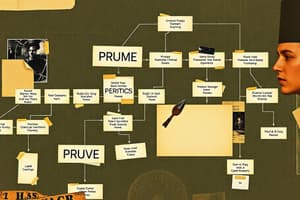Podcast
Questions and Answers
What is a flowchart?
What is a flowchart?
A diagrammatic or graphical representation of a sequence of logical steps of a program.
Why do we need to use a flowchart?
Why do we need to use a flowchart?
They help visualize complex processes and make explicit the structure of problems and tasks.
What is a terminator in a flowchart?
What is a terminator in a flowchart?
Used at the end or the beginning to represent the start and end of a process.
What does the process shape in a flowchart represent?
What does the process shape in a flowchart represent?
What does the data shape in a flowchart represent?
What does the data shape in a flowchart represent?
What does the decision shape in a flowchart indicate?
What does the decision shape in a flowchart indicate?
What do arrows in a flowchart represent?
What do arrows in a flowchart represent?
The classification of numbers is either ______ or odd.
The classification of numbers is either ______ or odd.
In a grading system, if the score is 60 or beyond, print ______.
In a grading system, if the score is 60 or beyond, print ______.
What wind speed classifies a Tropical Depression?
What wind speed classifies a Tropical Depression?
In the game Cytus, what letter signifies an excellent score?
In the game Cytus, what letter signifies an excellent score?
If a number is divisible by both 3 and 5, output ______.
If a number is divisible by both 3 and 5, output ______.
Flashcards are hidden until you start studying
Study Notes
Flowchart Overview
- A flowchart is a graphical representation of a sequence of logical steps in a program.
- It utilizes geometric shapes for processes and arrows to indicate relationships and data flow.
- Flowcharts facilitate visualization of complex processes and clarify the structure of problems and tasks.
- They can define processes or projects, aiding in effective communication and understanding.
Key Components of Flowcharts
- Terminator: Represents the start and end of a process, often labeled as "Start/Stop" or "End/Beginning."
- Process: Indicates processes or operations, such as mathematical calculations.
- Data: Also referred to as "Input/Output," representing information entering (input) or exiting (output) the system (e.g., customer orders).
- Decision: Represents decision points, typically yielding Yes or No outcomes in programming.
- Arrow: Illustrates the flow and direction of the process sequence.
Sample Problems Using Flowcharts
- ID Check: Determine if a person is a minor or an adult based on age input.
- Gender Classification: Classify gender as male or female based on input of a single letter (M/m or F/f).
- Even or Odd Classification: Classify numbers as even (divisible by 2) or odd (not divisible by 2).
- Grading System: Classify student scores into pass, conditional, or fail based on specific score ranges.
Exercises Utilizing Flowchart Logic
- Typhoon Classification: Categorize typhoons based on wind speed:
- Tropical Depression: Less than 62 kph
- Tropical Storm: 62 to 88 kph
- Severe Tropical Storm: 89 to 117 kph
- Typhoon: Greater than 117 kph
- Gas Money Calculation: Calculate change to be returned based on price per liter, quantity purchased, and payment made.
- FizzBuzz Challenge: Output "Fizz" for numbers divisible by 3, "Buzz" for those divisible by 5, and "FizzBuzz" for those divisible by both.
- Cytus Score Classification: Assign score quality based on letters S, A, B, C, D, with S representing excellent performance.
Studying That Suits You
Use AI to generate personalized quizzes and flashcards to suit your learning preferences.




